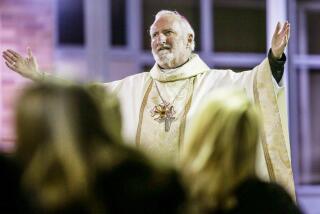Breaking: New York City’s Cardinal Edward Egan dead at 82
- Share via
Cardinal Edward M. Egan, a former Roman Catholic archbishop of New York City, died Thursday of cardiac arrest. He was 82.
Egan, who served as archbishop in the city from 2000 to 2009, was pronounced dead at New York University’s Langone Medical Center in Manhattan at 2:20 p.m., the archdiocese said in a statement.
He died at his residence earlier in the day, according to Joseph Zwllling, a spokesman for the archdiocese.
“My sympathy to his natural family, who will grieve for their uncle, and to you, his spiritual family here in the archdiocese of New York,” Cardinal Timothy Dolan, the current archbishop, said in a statement.
Dolan described Egan’s passing as a “peaceful death” in his statement.
New York Gov. Andrew Cuomo released a statement on Thursday described Egan as a constant positive influence in the city who helped New Yorkers heal after the Sept. 11, 2001 terror attacks.
“Cardinal Egan had a powerful and positive impact on our state and the world that will continue to be felt for years to come,” he said in his statement.
Born in Illinois in April 1932, Egan was ordained as a priest in Chicago in 1957. He served as an auxiliary bishop and vicar for education in New York City from 1985 to 1988, and returned to serve as archbishop in 2000.
The church credited Egan with helping to increase the number of registered parishioners and students enrolled in Catholic schools during his nine-year tenure as archbishop.
Egan retired in 2009 and was replaced by Dolan. He continued to serve several offices of the Vatican, and remained active and remained active in the church in New York City after his retirement, according to the archdiocese.
While the church has praised his tenure as archbishop, Egan was fiercely criticized in 2002 after announcing the archdiocese would not immediately refer all cases of alleged sex abuse by priests to prosecutors.
At the time, Egan said the archdiocese would only refer cases if the church determined there was reasonable cause to do so, and if the victims’ relatives did not object to that decision.
Times staff writer Tina Susman contributed to this reporter.
Follow @JamesQueallyLAT for breaking news
More to Read
Sign up for Essential California
The most important California stories and recommendations in your inbox every morning.
You may occasionally receive promotional content from the Los Angeles Times.














